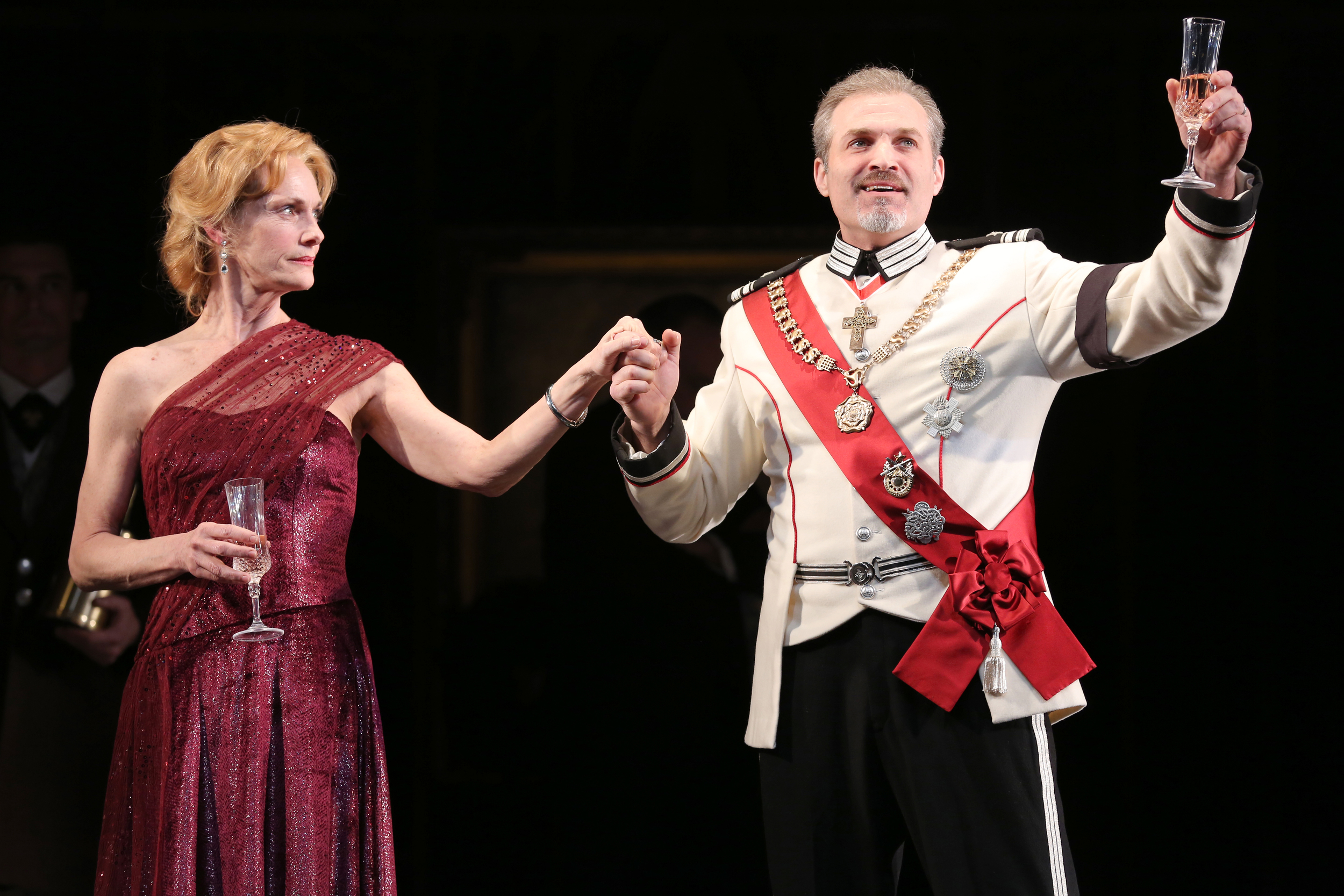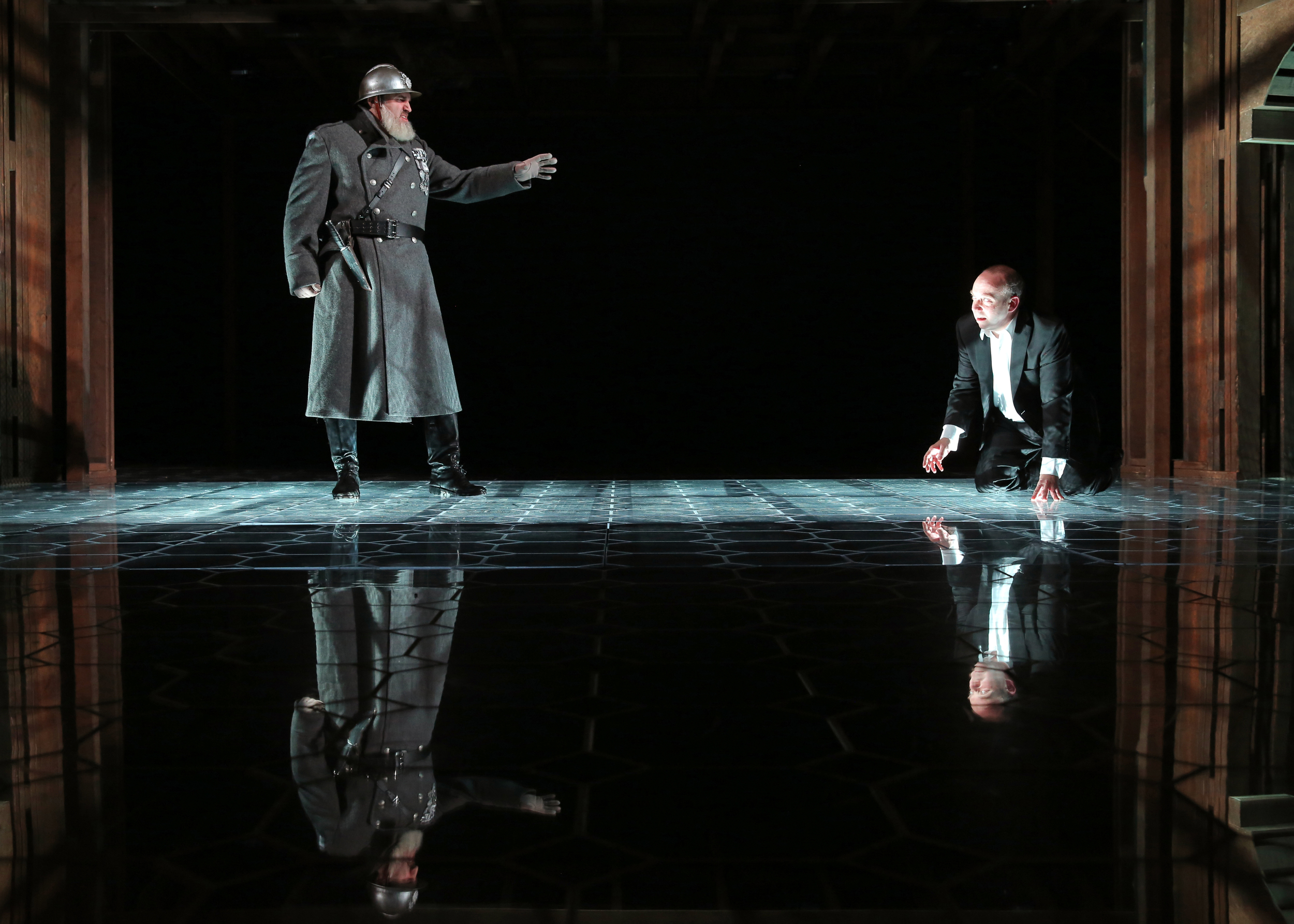Review of Assassins, Yale Repertory Theatre
Adam Shatz, writing in the London Review of Books in early March, conjectured that many in the so-called blue states have been “having criminal thoughts and violent fantasies since 9 November,” specifically, fantasies about the president’s death, “natural or otherwise.” Without coming right out and saying it, Shatz was entertaining the notion that many otherwise law-abiding and non-violent Americans are fantasizing about political assassination. “These thoughts are, in a way, a tribute to the power Trump has over the imagination,” Shatz writes, but if we shift away from our specific moment to a more general view of our country’s history, we could substitute “the president” for “Trump” in that statement. We might wonder how it is that killing one man—a man not born to power nor claiming it as a birthright but simply holding an office, in essence, doing a job for a limited time—can come to seem the end-all of political action. Killing him, removing him violently from office, becomes, in such a view, a victory for the cause of freedom. Or at least a liberation of one’s burning resentment.
Because, as Shatz avers, such ideas are in the air, James Bundy’s revival of Assassins, book by John Weidman, music and lyrics by Stephen Sondheim, couldn’t be more timely. Proposed for the season over a year ago, the show was slated to open after the first 100 days of whoever won in November, and a very real strength of Assassins is that it is ambivalent enough to be relevant to any sitting president. Though, in 2016, one could assume that the hatred or the embrace of any winner of that year’s presidential race would be, in 2017, unprecedentedly—or unpresidentedly—passionate. Such is the case, and Assassins is a fanciful, tuneful, and entertaining look at one of the many dark sides of U.S. exceptionalism.
As Bundy notes in the playbill, “no fewer than thirteen of our misguided countrymen and women have taken it upon themselves to strike at presidents. This show reckons with nine of them….” As portrayed here, the question of what guides their misguided steps is different in every case, and the outcomes vary as well—from killing to wounding to failing utterly—but, in each case, the would-be assassin gets written into history, paired with the fortunes of the respective target.
Charles Guiteau (Stephen DeRosa), Proprietor (Austin Durant) (photo: Carol Rosegg)
That pairing begins at once, with the Proprietor (Austin Durant), a boardwalk carny, offering a ragtag bunch of possible customers the chance to shoot a president. As Durant, in a sexier version of an Uncle Sam outfit, takes Leon Czolgosz (P. J. Griffith) or John Hinckley (Lucas Dixon) under his wing, huge projected images of that assassin’s target appear. Soon, eight—all but Oswald—have gathered, as a kind of ad hoc assassins convention, where nobodies will become somebodies. Of course, the biggest somebody of them all is also the last of the eight to arrive. John Wilkes Booth (Robert Lenzi) was a minor somebody, as an actor, and his bid for glory, as portrayed in “The Ballad of Booth” with Dylan Frederick as the Balladeer, offers both an ironic commentary but also a surprisingly dignified account of his reasons from Booth. It helps greatly that Lenzi and Frederick are both well-cast in their roles, with Lenzi looking very much the part and singing with great authority.
Balladeer (Dylan Frederick) (photo: Carol Rosegg)
Assassins keeps right on cooking, with lively moments—“How I Saved Roosevelt” (about the failed attempt by Giuseppe Zangara (Stanley Bahorek) to kill FDR)—and brooding moments, “The Gun Song,” a thoughtful ditty that takes off from the old “it takes a village” line to consider how much work goes into a gun and just how easy it is to move your little finger and change the world. For the most part, the would-be assassins are zanies and crazies, with some, like the two women who targeted President Ford, Lynette “Squeaky” Fromme (Lauren Molina) and Sara Jane Moore (Julia Murney), played for laughs. Fromme’s duet with Reagan’s would-be assassin Hinckley, “Unworthy of Your Love,” is a plaintive cry for significance, showing Hinckley’s obsession with Jodie Foster and Fromme’s with Charles Manson. The irony of such an earnest big number in service to these two—and Molina and Dixon are both very good as and look very much like their respective characters—points up what makes Assassins work so well: there’s a daytime soaps element to the self-conceptions of these killers, as if the purpose of life is to be immortal in the media.
Lynette "Squeaky" Fromme (Lauren Molina), John Hinckley (Lucas Dixon) (photo: Carol Rosegg)
That view is nowhere more apparent than in the show-stopping “The Ballad of Guiteau,” wherein Charles Guiteau (Stephen DeRosa), the assassin of President Garfield, gets to sell his particular brand. Guiteau is a jack of all delusions and DeRosa makes him an unforgettable presence, soft-shoeing up and down an impressive gallows, and inveighing lines from Guiteau’s odd paean to his own death, “I’m Going to the Lordy.” If you want to see a more striking, entertaining enactment of one of the true oddities of American history, you’re going to have to do some searching.
Indeed, the three successful assassins get their own ballads, and each is a high point. “The Ballad of Czolgosz,” like the one for Booth, gives Czolgosz the benefit of the doubt in suggesting the political nature of his despair—as an oppressed worker he sought out Emma Goldman (Liz Wisan) for inspiration and wanted to strike a blow for anarchy. Perhaps most plaintive—and unnerving of all—is Richard R. Henry’s inspired enactment of Samuel Byck, the man who—in the era of many a hijacked plane—decided he could get airplane pilots to crash a commercial flight into the White House to kill Richard Nixon. Byck, who was killed before the plane got off the ground, is seen here venting his “mad as hell” musings on cassette tapes addressing Leonard Bernstein and Nixon himself. Byck’s monologues let us hear an authentic voice of frustration coupled with a deranged view of how one man can make a difference.
front: Lee Harvey Oswald (Dylan Frederick), John Wilkes Booth (Robert Lenzi) and the cast of Assassins (photo: Carol Rosegg)
The one disappointment in the show comes from the handling of Lee Harvey Oswald (Dylan Frederick), the assassin of Kennedy. He doesn’t get a ballad, unfortunately, but gets instead a dialogue with Booth that largely falls flat because of Weidman’s inability to convey either the pathos of Oswald or his delusions (both of which figure so well in the case of Byck). Instead we get from the Bystanders (Fred Inkley, Courtney Jamison, Jay Aubrey Jones, Brian Ray Norris, Sana “Prince” Sarr, Liz Wisan), “Something Just Broke,” which trades on the old “where were you when it happened” motif of the JFK assassination (complete with a huge projection of the Zapruder film). The latter image, more than the song, does much to set up the harrowing sense of the finale, “Everybody’s Got the Right”—“no one can be put in jail for their dreams”—that gives a voice to the assassin in us all that Adam Shatz has in mind.
r to l: Proprietor (Austin Durant), Byck (Richard R. Henry), Hinckley (Lucas Dixon), Moore (Julia Murney), Zangara (Stanley Bahorek), Guiteau (Stephen DeRosa), Fromme (Lauren Molina), Czolgosz (P. J. Griffith), Booth (Robert Lenzi) (photo: Carol Rosegg)
The Yale Repertory Theatre revival of Assassins gives us a valuable musical with bite, a major entertainment about a very unentertaining aspect of American political life. Andrea Grody's orchestrations are tasteful and bright; the staging, but for somewhat pointless live camera feeds, is effective by being all to the service of the show, keeping our attention on the very good cast. Part cautionary tale, part ironic tribute to the little guy in history, Sondheim and Weidman’s show aims at the show-biz side of American history and kills it.
Assassins
Book by John Weidman
Music & Lyrics by Stephen Sondheim
Directed by James Bundy
Music Director: Andrea Grody; Associate Music Director: Daniel Schlosberg; Musical Staging: David Dorfman; Scenic Designer: Riccardo Hernandez; Costume Designer: Ilona Somogyi; Lighting Designer: Yi Zhao; Sound Designers: Charles Coes, Nathan A. Roberts; Projection Designer: Michael Commendatore; Production Dramaturgs: Matthew Conway, Lynda A. H. Paul; Technical Director: Steph Waaser; Dialect Coach: Ron Carlos; Fight Director: Rick Sordelet; Casting Director: Tara Rubin Casting, Laura Schutzel, CSA; Stage Manager: Paula R. Clarkson
Cast: Stanley Bahorek, Stephen DeRosa, Lucas Dixon, Austin Durant, Dylan Frederick, P. J. Griffith, Richard R. Henry, Stephen Humes, Fred Inkley, Courtney Jamison, Jay Aubrey Jones, Robert Lenzi, Lauren Molina, Julia Murney, Brian Ray Norris, Sana “Prince” Sarr, Liz Wisan
Yale Repertory Theatre
March 17-April 8, 2017









